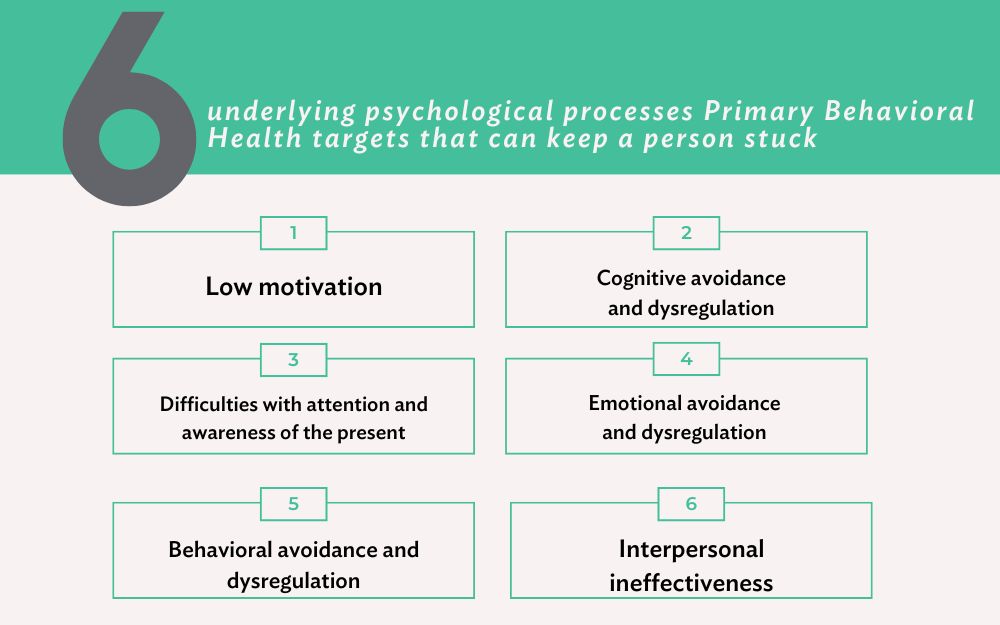As a leader and innovator in mental health and addiction care for more than a century, Rogers Behavioral Health is using a cutting-edge, evidence-based treatment approach to help reach a broader range of people.
What is Primary Behavioral Health?
“Process-based Cognitive Behavioral Therapy (CBT) is an emerging approach to delivering widely known psychotherapy in a more precise, individualized, and culturally responsive way,” says Dr. Ajeng Puspitasari, PhD, LP, ABPP, psychologist and executive director of clinical services. “In our Primary Behavioral Health programs, we focus on a person’s behaviors, emotions, thinking patterns, and other aspects that maintain disorders rather than a diagnosis. We’re working with patients to change the ineffective coping skills they’re using which are preventing them from living a full and healthy life.”
The approach used in Primary Behavioral Health targets the underlying psychological processes that can keep a person stuck:
- Low motivation
- Cognitive avoidance and dysregulation
- Difficulties with attention and awareness of the present
- Emotional avoidance and dysregulation
- Behavioral avoidance and dysregulation
- Interpersonal ineffectiveness
Strategies for changing those processes are shared across CBT protocols, giving clinicians the ability to customize treatment according to each client’s situation and unique presentation.
“Rogers prides itself on evidence-based treatments and following research-backed innovations in the field,” says Dr. Puspitasari. “Psychological science has advanced significantly. There’s more understanding that it can be really hard to implement just one treatment protocol for one diagnosis, considering our patients really struggle with multiple diagnoses.”
Rogers’ new Primary Behavioral Health programming gives treatment providers the flexibility to specifically target problematic processes underlying many disorders such as depression, anxiety, substance use, and personality disorders.
“This change in how we approach treatment for people with multiple diagnoses is a significant shift in the behavioral health field,” says Dr. Puspitasari. “It allows us to apply the same evidence-based treatment principles across multiple disorders while creating flexible and individualized treatment plans specific to the needs of each patient we treat.”
Primary Behavioral Health programs are guided by the process-based CBT approach, recovery-oriented model, and culturally humble care, where treatment team members collaborate closely with patients to help them manage symptoms effectively to pursue a healthier and more productive life. For example, that could mean targeting negative thought patterns with strategies such as cognitive diffusion or reappraisal.
Each patient starts with a series of evaluations and evidence-based assessments to develop a more complete understanding of the presenting concerns. The information provides the basis for a discussion and recommendations to chart a patient’s unique recovery journey.
How does Primary Behavioral Health impact communities?
Dr. Puspitasari says that the treatment model marks an important path forward for Rogers in providing care guided by evidence-based practice inclusive to diverse patient populations.
“Our Primary Behavioral Health expansion is an exciting step forward to complement our specialty, diagnostic-specific programs. It aligns with our organizational mission to incorporate cutting-edge innovations and evidence-based practices to best serve our patients move towards thriving lives,” she says.
Rogers’ chief medical officer, Dr. Brad Smith, MD, DFAPA, notes that this treatment approach allows Rogers to have greater reach in its aim to provide the highest quality, evidence-based care.
“Rogers has a strong foundation in many areas of behavioral health treatment, and we hope these new programs will provide a much needed service for the community, combining the quality tradition of Rogers with treatment approaches designed for many different mental health challenges,” says Dr. Smith. “The goals of optimizing functioning, building resilience, and rising above mental health challenges resonate with the type of empowerment that the clinical teams strive to help individuals achieve.”
Primary Behavioral Health programs at Rogers
Check here for the Rogers’ locations offering Primary Behavioral Health services. Rogers also plans to expand these offerings to adolescents and children.


